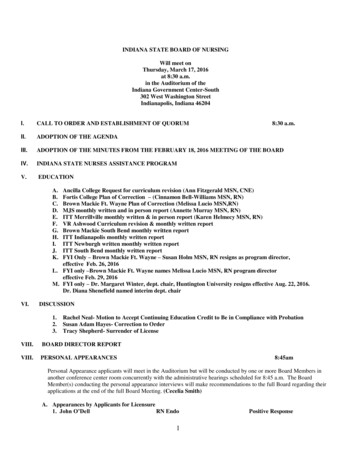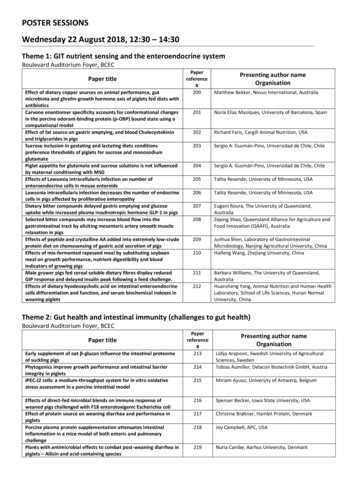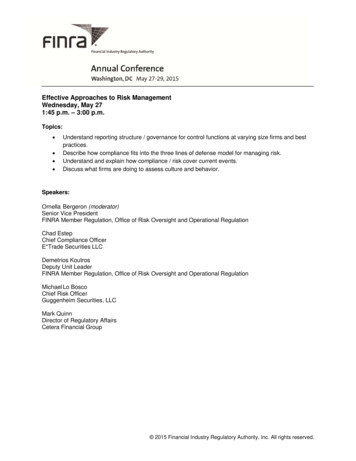
Transcription
The 8th AnnualWednesday-ThursdayMarch 17-18, 20214 pm - 7 pm1
Program overviewThe West Virginia Eating Disorder Network was developed in thesummer of 2013 to provide a forum for providers of all disciplinesto better understand and treat the complex challenges facedby clients with eating disorders. This conference is designedto review state-of-the-art clinical concepts and treatmentconsiderations for individuals with disordered eating. It willalso provide ample time for networking with other providersand treatment centers. Health providers including Psychiatrists,Psychologists, Licensed Professional Counselors, Social Workers,Nurses, Registered Dietitians, Addiction Counselors and otherinterested professionals and students are invited to attend. Thereare no prerequisites.Jointly provided by:CAMC Health Education and Research Institute and The West VirginiaEating Disorder Network1
AccreditationIn support of improving patient care, this activityhas been planned and implemented by theWVUDECC and CAMC Health Education andResearch Institute. CAMC Health Educationand Research Institute is jointly accredited bythe Accreditation Council for Continuing Medical Education(ACCME), the Accreditation Council for Pharmacy Education(ACPE), and the American Nurses Credentialing Center (ANCC),to provide continuing education for the healthcare team.Physicians – CAMC Health Education and ResearchInstitute designates this live virtual activity for a maximumof 6 AMA PRA Category I credit(s) . Physicians shouldonly claim credit commensurate with the extent of theirparticipation in this activity.Nurses – CAMC Health Education and Research Institute isan approved provider of continuing nursing education bythe American Nurses Credentialing Center’s Commissionon Accreditation. This offering has been approved for 6contact hours. (JA0026-22-21-303) Expiration date is 2 yearsfrom the course date.Pharmacy – The CAMC Health Educationand Research Institute is accredited by theAccreditation Council for Pharmacy Educationas a provider of continuing pharmacy education.To receive credit, participants must completethe sign-in sheet, attend each session and completean evaluation. ACPE credits will be posted online to theCPE Monitor within six (6) weeks following the activity.This knowledge based activity provides 6 contact hoursJA0006133-9999-21-004-L04-P.2
AccreditationPsychology – CAMC Health Education andResearch Institute is approved by the AmericanPsychological Association to sponsor continuingeducation for psychologists. CAMC HealthEducation and Research Institute maintainsresponsibility for this program and its content.LPC – The West Virginia Board of Examiners in Counseling hasapproved this program for 6 continuing education hours.Approval for 2021 is in processDietitians – Completion of this RD/DTRprofession-specific or IPCE activity awardsCPEUs (One IPCE credit One CPEU).If the activity is dietetics-related but nottargeted to RDs or DTRs, CPEUs may beclaimed which are commensurate withparticipation in contact hours (One 60 minute hour 1 CPEU).RD’ and DTRs are to select activity type 102 in their Activity Log.Performance Indicator selection is at the learner’s discretion.Social Work – CAMC Health Education and Research Instituteis an approved provider of continuing education by the WestVirginia Board of Social Work Examiners. This program has beenapproved for 6 hours of social work credit. Approval number#490045.Addiction/Prevention – CAMC Institute is an approved providerof continuing education by the West Virginia CertificationBoard for Addiction and Prevention Professionals. This program isapproved for 6 CEUS. Approval #AP-17-114.3
Program faculty and planningcommitteeJessica Luzier, PhD, ABPP, CEDSConference ChairClinical Director,WVU Disordered Eating Centerof CharlestonCharleston, WVRebecka Peebles, MDCraig Dalsimer Division ofAdolescent MedicineDepartment of PediatricsChildren’s Hospital ofPhiladelphiaPerelman School ofMedicine at The University ofPennsylvaniaPhiladelphia, PAChristine M. Peat, PhD, LPDirectorNational Center of Excellencefor Eating DisordersUniversity of North Carolina atChapel HillChapel Hill, NCJean Someshwar, MDAssociate Professor ofPediatrics and Division Chiefof Adolescent MedicineWest Virginia University Schoolof MedicineMorgantown, WV4
Agenda - Wednesday, March 17Introductions & Program OverviewJessica Luzier, PhD, ABPP, CEDSClinical DirectorWVU Disordered Eating Center of CharlestonWelcomeSenator Shelley Moore CapitoTopicsScreening, referral, and ongoing management of eatingdisorders in primary careChristine M. Peat, PhD, LPRebecka Peebles, MDAs the prevalence of eating disorders rises,access toevidence-based practice is dangerously limited. Despite theknown consequences of eating disorders on physical (e.g.,musculoskeletal, endocrine, immune, cardiovascular, and dental)and psychological health (e.g., suicide, comorbid substance usedisorders, depression, anxiety disorders, obsessive-compulsivedisorder), only 20-57% of those with eating disorders ever receivetreatment. Troublingly, treatment-seeking is even less likely amongthose from ethnic/racial minorities and those living outside urbanareas. Barriers to care include: the stigma associated with eatingdisorders, limited availability of eating disorder specialists, theprohibitive cost of care, and poor mental health literacy by bothhealthcare providers and the general public.Existing barriers to eating disorders specialty care highlight theimportant role of the primary care provider (PCP) in detectingthese conditions. However, detecting eating disorders in primarycare is not without its challenges. When patients do seek5
Wednesday, March 17 — Continuedtreatment for their eating disorder, they typically present to PCPswith other concerns such as physical health problems or othermental disorders often not even disclosing their eating disordersymptoms. Additionally, PCPs report limited knowledge about andcomfort with treating eating disorders, despite expressing a desirefor more comprehensive training.An increase in eating disorder prevalence and an inadequatehealthcare provider workforce converge to create a crisis in theeating disorders field. The current presentation aims to addressthis crisis by providing education and training in best practices fordetecting, screening, and providing ongoing management foreating disorders in a primary care setting. Participants will learnpractical skills and methods to apply in their practice to ensurethat those with eating disorders are appropriately identified andprovided with care.Learning Objectives (Beginner to Intermediate) Objective 1:Identify evidence-based screening measures and methods todetect eating disorders in primary care. Objective 2:Describe the medical assessmentand management of eating disorderdiagnoses and barriers to eatingdisorder detection. Objective 3:Describe evidence-based approaches tomanaging eating disorders in primary care. Objective 4:Discuss best practices for collaboratingwithin an eating disorders specialty team(e.g., therapist, dietitian, psychiatrist).6
Agenda - Thursday, March 18Identification and treatment of patients with eating disorders:A case-based approachJean Someshwar, MDFeeding and eating problems in childhood and adolescencefrequently cause consternation for both parents and providers,in differentiating self-limited developmental behaviors fromeating disorders requiring multidisciplinary treatment intervention.Community studies evaluating patients with disordered eatingbehaviors showed up to 22 % of youth affected, and with theapplication of strict diagnostic criteria, eating disorders in childrenand adolescents have an overall prevalence of around 4% inthe US population. (Swanson et al, Prevalence and Correlatesof Eating Disorders in Adolescents, Arch Gen Psych 2011 Jul;68(7):714-8723). Given the significant burden of morbidity andmortality in these patients, with anorexia nervosa having thehighest mortality rate of any mental health disorder (Arcellus et al,Mortality Rates in patients with Anorexia Nervosa and other EatingDisorders, Arch Gen Psych 2011), prompt identification of patientswith eating disorders is integral to care. Recently, the diagnosticcriteria for Eating Disorders has been updated in the DSM-5 toinclude 6 separate entities and introduced severity ratings foranorexia nervosa, bulimia nervosa, and binge eating disorder(Walsh, B. Diagnostic Categories for Eating Disorders, Psych Clin NAm 42 (2019)1-10.)Knowledge of these criteria inform providers’ ability toappropriately identify and refer patients for appropriatetreatment, specific to their illness. The current presentation willutilize a case-based approach to review diagnostic categoriesof Eating disorders, and to review current literature regarding besttreatment practices for outpatient and inpatient care of patientswith eating disorders.7
Thursday, March 18 — ContinuedLearning Objectives:At the end of this workshop, participants will be able to: Identify patients meeting diagnostic criteria for specificeating disorders, and apply criteria to formally rate theseverity of their illness. Formulate an appropriate plan for evaluation and treatmentfor patients with eating disorders based on current evidencebased guidelines, and understand common barriers andcomplications with treatment. Describe distinct treatment modalities for patients witheating disorders, and apply clinical data to select the mostappropriate treatment for given patient presentations. Describe prognostic factors impacting treatment outcomesin patients with eating disorders, and discuss interventionswhich may improve outcomes.8
Presenter backgroundsChristine M. Peat, PhD, LPDr. Christine Peat is the Director of the National Center of Excellencefor Eating Disorders (NCEED) and an Assistant Professor of Psychiatryat the University of North Carolina at Chapel Hill. She completedher undergraduate training in psychology at the University ofArizona and earned her master’s degree and doctorate in clinicalpsychology at the University of North Dakota. Her internship wasin behavioral medicine at West Virginia University, after which shewent on to complete her postdoctoral fellowship in eating disordersresearch at the University of North Carolina under the directorshipof Dr. Cynthia Bulik. As the Director of NCEED, Dr. Peat is focused onbroadly disseminating education and training on eating disordersto healthcare providers across a variety of disciplines. Her researchcenters on eating pathology across the spectrum, but with a distinctfocus on binge-eating disorder. She is particularly interested in theintersection between obesity, bariatric surgery, and eating pathologyand investigating physiological comorbidities associated with eatingdisorders.Dr. Peat is also a licensed psychologist in North Carolina and assuch, treats eating disorders across the spectrum, with a primaryfocus on binge eating. Given her background in behavioralmedicine, she has also established clinical services in GI Surgerywhere she provides bothpsychotherapy and behavioralmedicine interventions to thesepatient populations. In additionto her clinical and researchresponsibilities, Dr. Peat is alsoa clinical supervisor for predoctoral psychology interns,psychiatry residents, and mentorsundergraduate students.9
Presenter backgrounds — ContinuedRebecka Peebles, MDDr. Rebecka Peebles is the Director of Research and QualityInnovations of the Eating Disorder Assessment and TreatmentProgram at the Children’s Hospital of Philadelphia. She is an AssistantProfessor in the Craig Dalsimer Division of Adolescent Medicine andthe Department of Pediatrics at the Perelman School of Medicineat the University of Pennsylvania. She is a pediatrician with expertisein the medical complications of eating disorders in children andadolescents. Her research focuses on the impact of maladaptiveeating behaviors and weight regulation on cardiometabolic markers,bone health, and body composition, and she has been funded bythe American Heart Association, the National Institutes of Health, andprivate foundations. She also works to use quality improvement datato establish evidence-based treatment algorithms for inpatient andoutpatient care of young people with eating disorders.Jean Someshwar, MDDr. Someshwar is an Associate Professor of Pediatrics and Division Chiefof Adolescent Medicine at West Virginia University in Morgantown, WV.She completed her pediatric residency training at the Universityof Missouri-Columbia, and WVU in Morgantown and remained aspediatric faculty at WVU in Morgantown for over 10 years beforecompleting an adolescent medicine fellowship at Children’s NationalHealth System, where she remained as adolescent medicine facultyuntil returning to WVU first at Martinsburg, from 2018-2020, thenrelocated to her current position in Morgantown in 2020. Currently, sheis working with the Eating Disorders Interdisciplinary Treatment team(EDIT) to provide outpatient and medical stabilization inpatient servicesfor patients with eating disorders.Her clinical research interests include transition of care in patients witheating disorders, and identification and treatment of patients witheating disorders in the context of college health.10
Cancellations and substitutions policyYou may cancel your registration up to 10 business days beforethe program and we will refund your full registration. If you needto cancel less than 10 business days prior to the program youmay 1) send a substitute from your organization or 2) transferyour registration fee to another program of your choice that isscheduled with in 12 months of your original event. Please noteif you don’t cancel and don’t attend you are still responsible forpayment.DisclosureIt is the policy of the CAMC Institute that any faculty (speaker)who makes a presentation at a program designated for AMAPhysician’s Recognition Award (PRA) Category I or II creditmust disclose any financial interest or other relationship (i.e.grants, research support, consultant, honoraria) that facultymember or spouse/partner has with the manufacturer(s) of anycommercial product(s) that may be discussed in the educationalpresentation.Program planning committee members must also disclose anyfinancial interest or relationship with commercial industry thatmay influence their participation in this conference. All facultyand planning committee members have disclosed that norelationships exist.11
1-19-2021
Nurses – CAMC Health Education and Research Institute is an approved provider of continuing nursing education by the American Nurses Credentialing Center’s Commission on Accreditation. This offering has been approved for 6 contact hours. (JA0026-22-21-303) Expiration date is 2 years from the course date. Pharmacy – The CAMC Health Education











